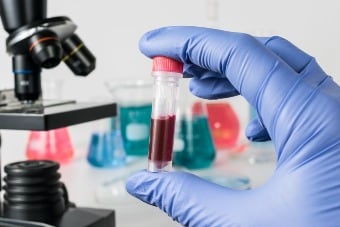Freenome Launches Its First Study for the Detection of Multiple Cancers That Pairs Muliomics with Real-World Data
NEWS PROVIDED BY Freenome Holdings, Inc. Sep 06, 2022, 08:00 ET
- The company is pioneering a new approach for the development and improvement of
its test platform by combining multiomics with real-world data
- The Sanderson Study underscores Freenome's commitment to reducing the gap between research and clinical decision support to improve blood test accessibility
 Freenome, a privately held biotech company, today announced the launch of the Sanderson Study, the company's latest study of its multiomics platform, in combination with real-world data to detect multiple cancers.
Freenome, a privately held biotech company, today announced the launch of the Sanderson Study, the company's latest study of its multiomics platform, in combination with real-world data to detect multiple cancers.
The study will encompass both traditional and real-world data to generate evidence of clinical validation for certain high- and elevated-risk populations while also refining the platform's cancer classification and risk prediction models. In addition, the Sanderson Study will build the necessary infrastructure to bridge the gap between clinical research and day-to-day clinical impact.
Freenome is developing a tailored multi-cancer screening approach that assesses a patient's individual risk and identifies cancer signals to provide patients with a clear path forward. Freenome uses a multiomics platform, combining tumor and non-tumor signals with machine learning to detect cancer in its earliest stages using a standard blood draw.
The Sanderson Study will enroll approximately 8,000 patients through Freenome's clinical study partner network and numerous regional health systems across the United States. The study will focus on those cancers with significant unmet needs such as pancreatic and lung cancer.
"We're incorporating real-world data with a precision health mindset on clinical actionability," said Lance Baldo, M.D., chief medical officer at Freenome. "Our goal is to identify the right patient for the right screening tests at the right time, with clear next steps. We believe this approach will ultimately save more lives."
Key collaborators include Oracle Cerner and its Learning Health Network (LHN), a group founded in 2020 of more than 90 diverse health systems across the U.S. that are working together to advance research and increase equitable access to clinical trials by contributing de-identified data to the LHN. In addition, Elligo Health Research will collaborate with LHN members using existing health data to identify and enroll patients significantly faster than traditional recruitment models. Trial participation will help LHN members bring innovative cancer prevention testing to the communities they serve.
"Early cancer detection with more convenient screening will expand available treatments with better outcomes for patients," said Christy Dueck, vice president of Cerner Enviza, an Oracle company. "Oracle Cerner is thrilled to be working with Freenome to help expedite the study process, from hospital and health system readiness to patient participation and identification. The Learning Health Network acts as an accelerant by addressing the current challenge of the scarcity in sites in the traditional clinical-trial model by creating an abundance of patients who are already actively engaged in healthcare."
"Achieving earlier detection of cancer is critical to improving health outcomes and we're honored to bring this groundbreaking research to our community," said Ruth Colby, president and chief executive officer of Silver Cross Hospital, a Learning Health Network member in the Chicago area. "This opportunity enables us to expand clinical research opportunities for patients and further our mission to care for members of our community."
Freenome's clinical studies are named for employees' loved ones who battled cancer. This study honors Tim Sanderson, the father of a Freenome engineer.
To learn more about the Sanderson Study, visit clinicaltrials.gov.